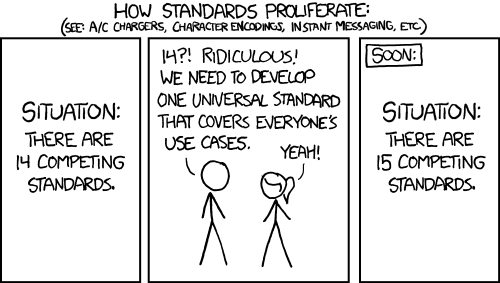02.24.2014 00:12
pkg-config
I had never really used pkg-config before today.
Turns out to be reasonably simple. I read through the man page an
here is me messing with it.
type -a pkg-config
pkg-config is /sw/bin/pkg-config
dpkg -S /sw/bin/pkg-config
pkgconfig: /sw/bin/pkg-config
fink list -i pkgconfig | grep -v virtual
i pkgconfig 0.25-2 Manager for library compile/link flags
pkg-config --help
pkg-config --list-all
pkg-config --list-all | wc -l
300
pkg-config --list-all | head -4
gstreamer-tag-0.10 GStreamer Tag Library - Tag base classes and helper functions
libmetalink libmetalink - Metalink library
xf86rushproto XF86RushProto - XF86Rush extension headers
fontsproto FontsProto - Fonts extension headers
pkg-config x11 && echo 'yes'
yes
pkg-config missing && echo 'yes'
pkg-config missing || echo 'do not have "missing"'
do not have "missing"
pkg-config --print-variables x11
xthreadlib
exec_prefix
prefix
includedir
libdir
pkg-config --print-provides x11
x11 = 1.6.2
pkg-config --print-requires x11
xproto
kbproto
pkg-config --cflags x11
-I/opt/X11/include
pkg-config --libs x11
-L/opt/X11/lib -lX11
02.18.2014 09:06
A unified marine sensor logging format
This is the first of a series of
posts I hope to write.
https://xkcd.com/927/

See also: Toils of AIS by Eric S. Raymond and Kurt Schwehr.
I am frustrated that each sub-community of marine related sensors has their own data formats for raw logging. Even worse, each vendor has their own format (with many different messages as they innovate over the years). Those formats require a wide range of support libraries and often not easily extensible. We have formats for multibeam sonars, seismic systems, acoustic recorders (hydro and geo-phones), seismic stations (really just a 3-axis, 3-channel geo-phone), lidar, ships' and GPS sensors, magnetometers, radar, grids, images, vectors, metadata, and more. Those formats treat data in other formats as orthogonal. Most of encodings used for those formats are not even described in the Wikipedia article on Comparison of data serialization formats. Worse yet, some key standards are behind paywalls, which greatly hampers adoption (e.g. try pricing all the ISO standards related to metadata). On top of that, some of these standards are so confusing that it is nearly impossible to create conformant data streams.
In this series, I will be arguing that the sonar community needs to get away from systems like the Generic Sensor Format (gsf) and move to a unified machine and human readable specification system for the data stream at the lower levels. I will be pushing for using ProtoBuffers (protobuf). Protobufs were created by Google and are heavily used within Google. I have a fair bit of experience with them as I have been working for Google for the last 2 years. However, there are other formats, such as BSON, that could work. I do feel like I'm repeating myself with this. I argued for a custom XML representation of AIS messages starting in 2006 and declaring defeat in 2010 as the AIS community opted to stick with their amazingly terrible status quo.
An additional concern is that people have proposed formats or tools that are either only used in a small community, are not tested across a number of key programming languages or revert to defining the raw bit level packaging such that the software engineers of every piece of code that will touch this format will have to understand the low level details.
In this first post, I'd like to explore the use cases. What are the range of problems that we are trying to solve? I'm attempting to think about 50 or so years into the future, a near impossible task, but some things will most certainly be correct. Storage of data will become more affordable in terms of cost, power required, volume/mass required. Compute power for an available budget will increase. Sensors will become more affordable and their diversity will increase.
I have not had a chance to flush out these use cases, but I do not want to wait any longer to get this starter post on line.
* Single beam echo sounder from a ship
* Multibeam echo sounder ship
* Multi-channel seismic vessel
* Lidar from an aircraft
* An AUV, Glider, Argos style device with IMU
* Super cheap land sensor networks without GPS
* ADCP mounted on the sea floor
- without external intervention for long periods - event based time corrections
* An array of sea floor devices
- down for an extended period with slow intermittent acoustic connections
* Ping editing a multibeam sonar
* Post processing to get time and location
* Post collection indexing to allow fast access
* Later splicing of multiple platforms into a single stream
- inlining of forward and backwards index messages
* Non-survey ship underway
https://xkcd.com/927/

See also: Toils of AIS by Eric S. Raymond and Kurt Schwehr.
I am frustrated that each sub-community of marine related sensors has their own data formats for raw logging. Even worse, each vendor has their own format (with many different messages as they innovate over the years). Those formats require a wide range of support libraries and often not easily extensible. We have formats for multibeam sonars, seismic systems, acoustic recorders (hydro and geo-phones), seismic stations (really just a 3-axis, 3-channel geo-phone), lidar, ships' and GPS sensors, magnetometers, radar, grids, images, vectors, metadata, and more. Those formats treat data in other formats as orthogonal. Most of encodings used for those formats are not even described in the Wikipedia article on Comparison of data serialization formats. Worse yet, some key standards are behind paywalls, which greatly hampers adoption (e.g. try pricing all the ISO standards related to metadata). On top of that, some of these standards are so confusing that it is nearly impossible to create conformant data streams.
In this series, I will be arguing that the sonar community needs to get away from systems like the Generic Sensor Format (gsf) and move to a unified machine and human readable specification system for the data stream at the lower levels. I will be pushing for using ProtoBuffers (protobuf). Protobufs were created by Google and are heavily used within Google. I have a fair bit of experience with them as I have been working for Google for the last 2 years. However, there are other formats, such as BSON, that could work. I do feel like I'm repeating myself with this. I argued for a custom XML representation of AIS messages starting in 2006 and declaring defeat in 2010 as the AIS community opted to stick with their amazingly terrible status quo.
An additional concern is that people have proposed formats or tools that are either only used in a small community, are not tested across a number of key programming languages or revert to defining the raw bit level packaging such that the software engineers of every piece of code that will touch this format will have to understand the low level details.
In this first post, I'd like to explore the use cases. What are the range of problems that we are trying to solve? I'm attempting to think about 50 or so years into the future, a near impossible task, but some things will most certainly be correct. Storage of data will become more affordable in terms of cost, power required, volume/mass required. Compute power for an available budget will increase. Sensors will become more affordable and their diversity will increase.
I have not had a chance to flush out these use cases, but I do not want to wait any longer to get this starter post on line.
* Single beam echo sounder from a ship
* Multibeam echo sounder ship
* Multi-channel seismic vessel
* Lidar from an aircraft
* An AUV, Glider, Argos style device with IMU
* Super cheap land sensor networks without GPS
* ADCP mounted on the sea floor
- without external intervention for long periods - event based time corrections
* An array of sea floor devices
- down for an extended period with slow intermittent acoustic connections
* Ping editing a multibeam sonar
* Post processing to get time and location
* Post collection indexing to allow fast access
* Later splicing of multiple platforms into a single stream
- inlining of forward and backwards index messages
* Non-survey ship underway
02.07.2014 10:50
Google Docs Mac OSX 10.9 Mavericks
For my desktop, I have linux (I gave
up on macs for the desktop), but for my mobile devices, I've been
using Mac devices. Mac OSX is really frustrating at a low level
compared to Linux, but I like the hardware (minus the lack of
easily fixing). Here is what I do to survive in the Mac OS X world.
I've given up Microsoft Office, Photoshop and Illustrator now that
I'm not a full time professor making posters and living in the
painful UNH IT environment. I used to do this in MediaWiki format
inside of CCOM, but I don't want to have to tunnel into CCOM for
this and I'd like it to get more eyeballs. I rarely got feedback
from others, so why would I keep it closed? I will be leaving out
stuff specific to the places I work in a lot of cases, but I will
share a bit when it doesn't expose confidential business
practices.
At the time of this post, the document is hardly even a Work-In-Progress (WIP).
Mac OSX 10.9 Setup
At the time of this post, the document is hardly even a Work-In-Progress (WIP).
Mac OSX 10.9 Setup
